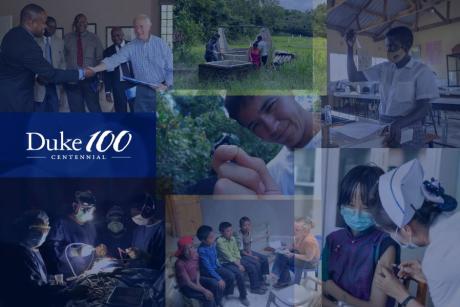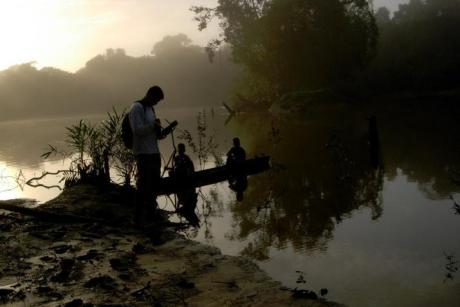A team of Duke students doing global health field research in Peru this summer took a short break from their work to help young children in nine communities along the Madre de Dios River learn good dental hygiene. The Duke team held a series of charlas, or talks, for Peruvian elementary and preschool children and their parents on how to brush their teeth. The team distributed 500 toothbrushes and tubes of toothpaste to the children thanks to a donation from a local company, Intradevco, Industrial S.A.
The students gave an informal presentation on how to prevent cavities, the importance of teeth-brushing, and then practiced tooth-brushing techniques with the kids. Partners from the Peruvian Navy and a Navy dental officer also took part in the charlas.
“It was a fantastic service opportunity for our students, and reinforces the idea that global health practitioners and researchers must be able to adapt in the field based on the needs they encounter,” said William Pan, DGHI faculty member who leads the project. “We saw a real need in the communities where we’re working, and we were able to act quickly and make an impact.”
“During one of our first field visits to the area this spring, I was asked to assess a little child with fever and I was surprised to find most of his teeth had cavities. I knew then that we needed to do something to help,” said Ernesto Ortiz, a physician, DGHI researcher and field director for the Peru Bass Connections in Global Health project. “When we returned to the area with the Bass connections team tis summer, it was important for the students to get involved with this service project.”
Dentists are not common along the river, and people have to travel long distances to the nearest city to seek care.
“Even though it wasn’t related to our research, I thought this would be important. It quickly became apparent how much of an issue dental hygiene is in these communities,” said Duke student Charlotte Lee in her blog post on Diaries from the Field. “Though there may not be fresh fruits and vegetables, there is never a deficit of soda, candy, cookies, and beer in any of these communities. The mouths of the adults are often filled with metal from dental work, or teeth are missing. Visible cavities in the mouths of the children are also common.”
The Duke team’s main global health research project is exploring the human health impacts of heavy metal exposure and emerging infectious diseases along the Madre de Dios watershed of the Amazon, a primary water source for neighboring communities. The project is part of the Duke initiative Bass Connections, which provides opportunities for students at various levels and disciplines to work closely with Duke faculty on complex social issues.
The oral hygiene charla was not the first unplanned service project by the Duke research team. The team also worked with the Peruvian Navy and the Madre de Dios Health Directorate to help bring several Peruvian residents in critical need of medical care to a health facility by boat. They used a Navy vessel to evacuate a 48-year-old woman from her home who was suffering from complications from an ovarian cyst diagnosis a year prior. They found her in severe pain, with limited mobility and difficulty breathing. The team delivered her to a hospital to get stabilized and treated.
“This medical evacuation was thanks to the strong network of collaborators we have created,” said Ortiz. “This and the oral hygiene education activity are both rewarding experiences that serve to highlight a few of the many ways Duke is making a difference in the Peruvian Amazon.”



